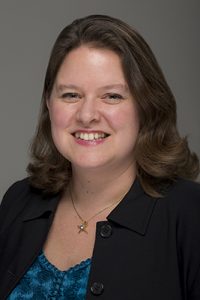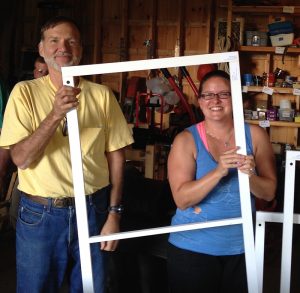Researcher Reflections – Sharon Klein
 Dam decision-making, community solar power and window inserts
Dam decision-making, community solar power and window inserts
Sharon Klein, an associate professor in UMaine’s School of Economics, researches the technical, economic, environmental and social tradeoffs inherent in the production, distribution, and use of energy. But her passion lies in the development of community-based energy and efficiency projects in conjunction with her teaching undergraduate and graduate students through service learning.
What problem/s are you working to solve?
How can a technique called Multi-Criteria Decision Analysis (MCDA) work in a group setting help people involved in dam decision-making reach outcomes that enhance social, economic, and environmental sustainability?
MCDA compares multiple dam options—removal, increased hydropower/fish passage—across several different decision criteria—fish habitat, renewable energy production, greenhouse gas emissions reductions—to facilitate the decision-making process.
What organizational and financial structures can help accelerate grassroots community solar development in a way that enhances social, economic, and environmental sustainability?
Organizational structures include who owns/hosts what, low-to-moderate income access, recruitment strategies, etc. Financial structures include low-income loans, on-bill financing, third party financing, crowdfunding, power purchase agreements, etc.
What is the role of Maine’s unique and growing grassroots window insert production program in the larger space of energy sustainability?
What progress are you making toward solutions?
As a principal investigator in the Future of Dams (FoD) project, I am leading the development of a free, web-based MCDA tool and associated workshop process that asks participants to specify preferences for a set of decision criteria—such as fish habitat, renewable energy production, greenhouse gas emissions reductions—dams along the Penobscot River coming up for federal relicensing in the next 10 years. Both the tool and process focus on multiple dams at once and the interactions between the dams and riverways rather than each dam in isolation. They were tested at a stakeholder workshop in October, along with an evaluation rubric (to help us tell if the workshop/tool is a success or not) developed with funding from the USGS.
With funding from the Mitchell Center, I completed a survey and economic analysis of community-based solar projects in Maine, Massachusetts, and Vermont, led the development, in collaboration with UMaine’s School of Computing and Information Science, of a free online database of community-based energy projects across the United States, and represented UMaine as one of only a handful of academic institutions in the National Community Solar Partnership.

Also with funding from the Mitchell Center, I completed three surveys and an economic and environmental analysis of energy savings associated with window inserts and developed/ implemented a research-oriented service learning program in which UMaine students help local communities build window inserts to save energy and emissions. I am now on the Board of Directors for WindowDressers, doing my part to help the organization, which is growing fast, continue to serve its mission while also expanding into new areas.
How could your findings contribute to a more sustainable future in Maine and beyond?
There are eight dams regulated by the Federal Energy Regulatory Commission (FERC) coming up for relicensing in the next decade. These relicensing events are key times to evaluate the social, economic, and environmental sustainability of existing hydropower dams from a variety of stakeholder perspectives. Our hope is that the new tools we are developing and testing will be used, and adapted to target their needs, by many of the people involved in these relicensing efforts to come to agreement about priorities and/or develop settlement agreements in advance of FERC relicensing steps.
The community solar and window insert research can (and already has) helped Mainers be more aware of existing options for them to be involved in advancing energy sustainability in their own lives and beyond. It has also helped grassroots organizations better understand the social, economic, and environmental benefits of these solutions. As my community energy work has focused on state, regional, and national analyses, these contributions extend beyond Maine to New England and the nation.
Why did you decide to join the Mitchell Center?
It was a natural fit. The Mitchell Center’s solutions-oriented mission is very much aligned with my research, teaching, and service interests. Over the past several years, I have worked closely with Mitchell Center members through the FoD and have been funded by the Mitchell Center for my community energy work.
What’s the best part about collaborating on Mitchell Center research projects?
Every time I meet with another researcher or stakeholder through a Mitchell Center research project, I learn something new. I am constantly growing and learning as a researcher, educator, and person. It is fun and exhilarating. It also constantly inspires new ideas for improving my research and teaching. It is very rewarding being part of a center that wants to help people and the environment. That’s what I am all about.
What sustains you?
Working on interesting, exciting, and rewarding projects that help people and the environment and keep my mind fresh; working with and learning from bright and collaborative colleagues who have different ideas and perspectives about how to advance sustainability solutions; spending time outdoors – hiking, camping, swimming, kayaking, paddle boarding, canoeing, running, walking; spending time with my two children and husband; traveling to new places and having new adventures.
